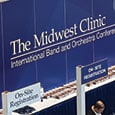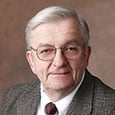.jpg)
The piccolo is as popular in Australia as in the United States. On recent visits to Australia, I found worthy additions to the piccolo repertoire by five contemporary composers.
My first stop was at the Australian Music Center in the historic Rocks section of Sydney. Unlike the typical music store in the U.S. where you may freely peruse the shelves, the customer instead browses a database on a computer and submits a request for a piece of music. Since multiple copies of the music are not kept in stock at the Center, one is printed and mailed to you several days later or you may return to pick it up.
The second stop was at the biannual Australian Flute Festival in Canberra. The two main dealers of music exhibiting were the Australian Music Center and Flutes and Flutists (both based in Sydney) along with several self-published composers.
Pesky Piccolo
Eric Gross (1926-2011) was an Austrian-Australian pianist and prolific composer who studied at Trinity College and the University of Aberdeen. His credentials range from studio pianist for the BBC, teaching at the Sydney Conservatorium at the University of Sydney, film score writer, and conductor. Pesky Piccolo was written in 2002 for piccolo and piano; Gross brings out the playful character of the piccolo in this three-minute gem while keeping the range of this piece primarily in the lower two-octaves. He uses contemporary harmonies while keeping the piece melodic and pleasing to hear. While suitable for intermediate players, this piece works well on any recital.
Raft Song at Sunrise and Ulpirra
Ross Edwards (b. 1943) is one of Australia’s most noted composers. His music reflects Australia’s cultural diversity, natural beauty, and a belief in the healing power of music. His composition Dawn Mantras ushered in the 21st century from the sails of the Sydney Opera House.
Raft Song at Sunrise (1995) was actually written for solo shakuhachi but works well as a solo piccolo piece. This contemplative piece was written for Riley Lee to perform at an art exhibit. It is suitable for intermediate players even though it contains wide dynamic contrasts. Ulpirra (1993) for solo piccolo is dance-like in character and joyful in spirit. Recently Edwards has transposed this piece for other members of the flute family. Ulpirra and Raft Song at Sunrise would work well together on a recital.
Sketch
Michal Rosiak (b. 1977) is a graduate of the Academy of Music in Katow, Poland and is a flutist with the Australian Army Band in Brisbane and the Queensland Symphony Orchestra. He has written and arranged compositions for woodwind and string ensembles and has won several prizes for his compositions including the International Festival for Young Musicians in Belgium, the Polish Contest for Chamber Music, and the Polish National Contest for Young Composers. Sketch for piccolo and piano (2009) is a short, sprightly scherzo which brings out the playful nature of the piccolo.
Perelandra
Michael Sollis (b. 1985), a nationally renowned composer, researcher, artistic director, and educator, is based in Canberra, Australia’s national capital. He was a student of Larry Sitsky and Jim Cotter while he was a student at the Australian National University. He currently teaches composition at the school and is composer-in-residence for Voices of Australia and Music for Everyone. A strong advocate for contemporary music at all levels of performance; he founded the Sound ACT (Australian Capital Territory) program in 2005, which brought contemporary composition into the schools.
Perelandra (2010) is a 20-minute concerto, written for his flutist wife, Kiri. The piece was inspired by the C.S. Lewis novel of the same name and is available with piano reduction as well as with string orchestra and a mixed ensemble of bass clarinet, horn, harp and vibraphone. Each of the four movements contains a quote from the Lewis book to set the mood. The first movement, The Floating Island, is depicted by rolling 32nd note runs in the piccolo part and 16th note arpeggiated triplets in the accompaniment. The second movement Ransom, it said again depicts the persistent, menacing voice calling Ransom’s name over and over again. The haunting mood is created with extended techniques such as lip glissandos and unfocused flutter tonguing. The third movement, The Chase, was the final round competition selection for the 2011 Piccolo Artist Competition held at the Australian Flute Festival in Canberra. The final movement, Inside the Mountain, depicts the gods bowing to the young Lilliputian King and Queen in a valley filled with a magical light. A performance of this piece may be found on You Tube.
Eliza’s Aria
Elena Katz-Chernin (b. 1957) is originally from Tashkent, now the capitol of Uzbekistan, but immigrated to Australia in 1975. While in Europe she wrote for state theaters in Berlin, Vienna, Hamburg and Bochum. Since 1994 she has written four operas, two piano concertos, silent film tracks, and compositions for Australian ensembles such as the Bang on a Can All-Stars, the Australian Chamber Orchestra, and the Sydney Symphony. Her music was featured at the opening ceremonies of the 2000 Sydney Olympic Games and the 2003 Rugby World Cup. Eliza’s Aria (2009) is based on her original score for the ballet Wild Swans, choreographed by Meryl Tankard. Written mostly in the low and middle registers, this charming, cut-time piece has a forward moving lilt that makes listeners smile.
While the world seems to get smaller every day, there are still musical treasures for the piccolo to be found. For more information about the piccolo compositions by Gross, Edwards, Sollis, and Katz-Chermin go to www.australianmusiccentre.com.au and for Rosicak www.mrflute.com.au.





